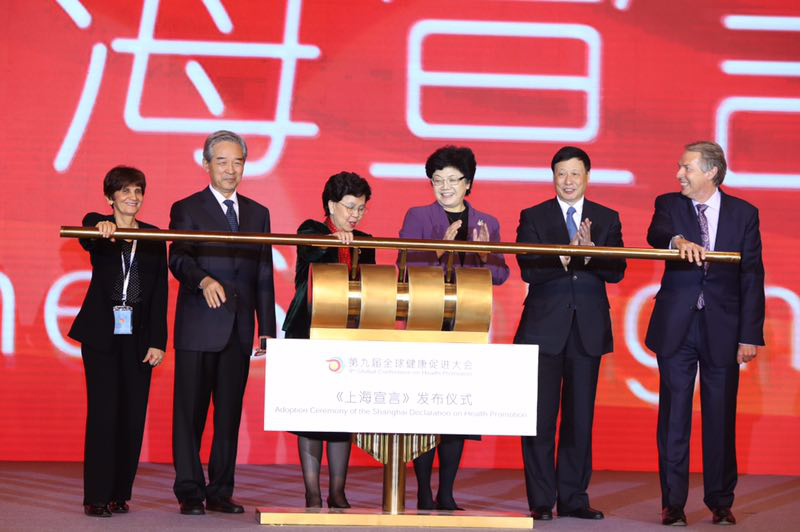World health leaders endorse Shanghai Declaration on Health Promotion at 9GCHP
Government health ministers, global mayors and NGO leaders laid out the future of global health by endorsing the Shanghai Declaration on Health Promotion at the 9th Global Conference on Health Promotion (9GCHP) on Nov 21.

Siddika Mithani(L1), president of the Public Health Agency of Canada (PHAC) on behalf of the government of Canada, Wang Longde, Chair of SAG and President of China Preventative Medicine Association, China, Margaret Chan, (L3)Director- General of WHO, Li Bin (R3), Minister of National health and Family Planning Commission, China, Ying Yong( R2), Executive Vice Mayor of Shanghai, China, Don Nutbeam, vice-chair of Scientific Advisory Group of the Conference, and Professor of Public Health, University of Sydney, Australia, adopt the Shanghai Declaration on Health Promotion on Nov 21 at the 9GCHP. [Photo by Gao Erqiang/China Daily]
The declaration seeks to promote health in accordance with the 2030 Agenda for Sustainable Development and accelerate towards specific Sustainable Development Goal (SDG) targets.
While announcing the declaration, Margaret Chan, Director-General of the World Health Organization, the conferences co-sponsor, reiterated that health is a universal right and should be a shared social goal and take political precedence.
The declaration urges governments on both a national and local level to integrate health into their sustainable development agenda. It advocates mayors to build healthy cities, conduct cross-sector actions, advocate public participation and improve health literacy. It commits those in positions governance to improve political guarantees for health promotion and fiscal investment to achieve SDGs set forth in the UN's 2030 Agenda for Sustainable Development.
The declaration places health and wellbeing as a core factor in achieving sustainable development and recognizes the value of in investing in health, guaranteeing health coverage for all and reducing health inequity in all ages. It advocates the promotion of health through all SDGs and the engagement of the whole of society in the health development process, and calls upon government and city leaders to take decisive actions on all determinants of health.
Common existing global health crises need the concerted efforts of global governments, according to the declaration. It adds that solving unacceptable health inequity requires both cross-sector and cross-district political actions, and joint actions around the globe. Decisive actions should be taken to protect the rights of women, people on the move and of the increasing number of people affected by humanitarian and environmental crisis.
The declaration points out that the practice of good governance is crucial for health and recognizes the fundamental responsibility of national local and global governments to address the damaging effects of unsustainable production and consumption. Attendees of the 9GCHP were encouraged to make full use of the mechanisms available to government to protect health and promote wellbeing through public policies; strengthen legislation, regulation, and taxation of unhealthy commodities; implement fiscal policies as a powerful tool to enable new investments in health and wellbeing, including strong public health systems; introduce universal health coverage as an efficient way to achieve both health and financial protection; ensure transparency and social accountability and enable the broad engagement of civil society; strengthen global governance to better address cross border health issues; and consider the growing importance and value of traditional medicine in contributing to improving health outcomes.
The declaration points out that cities and communities are critical settings for health.
"We must address the toxic combination of rapid rural-to-urban migration, global population movements, economic stagnation, high unemployment and poverty as well as environmental deterioration and pollution," the declaration reads.
Attendees also committed to: prioritizing policies that create benefits between health and wellbeing and other city policies, making full use of social innovation and interactive technologies; supporting cities to promote equity and social inclusion, harnessing the knowledge, skills and priorities of their diverse populations through strong community engagement; re-orienting health and social services to optimize fair access; and putting people and communities at the center of health policy.
It emphasizes that health literacy promotes empowerment and equity, and is founded on inclusive and equitable access to quality education and life-long learning.
The declaration also called on people present to: recognize health literacy as a critical determinant of health and invest in its development; develop, implement and monitor inter-sectoral national and local strategies for strengthening health literacy in all populations and in all educational settings; increase citizens’ control of their own health and its determinants, through harnessing the potential of digital technology; ensure that consumer environments support healthy choices through pricing policies, transparent information and clear labeling of harmful products.
